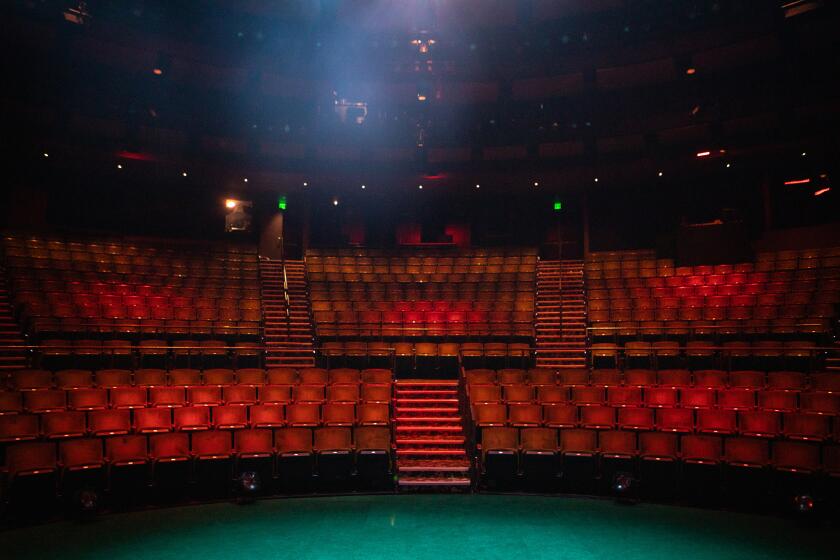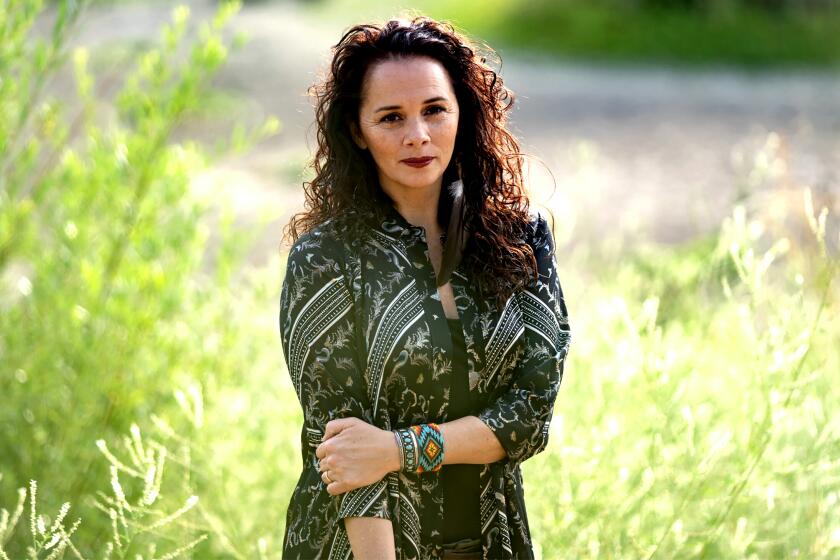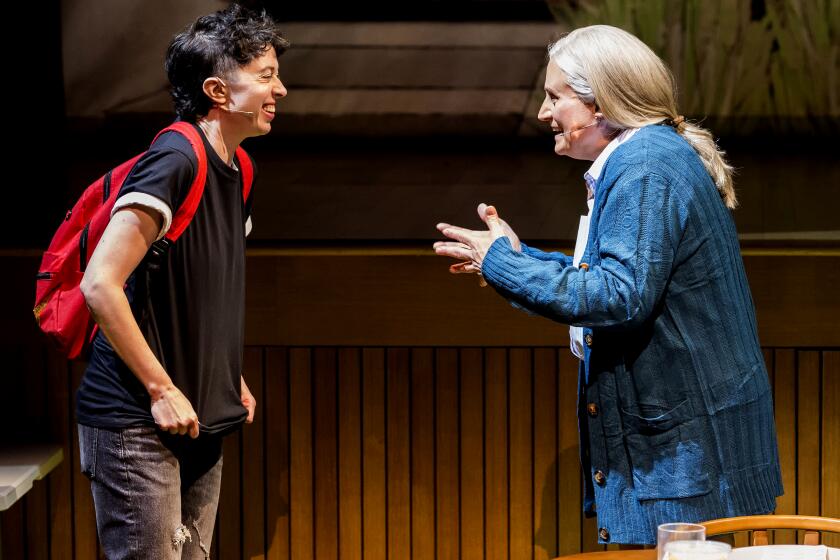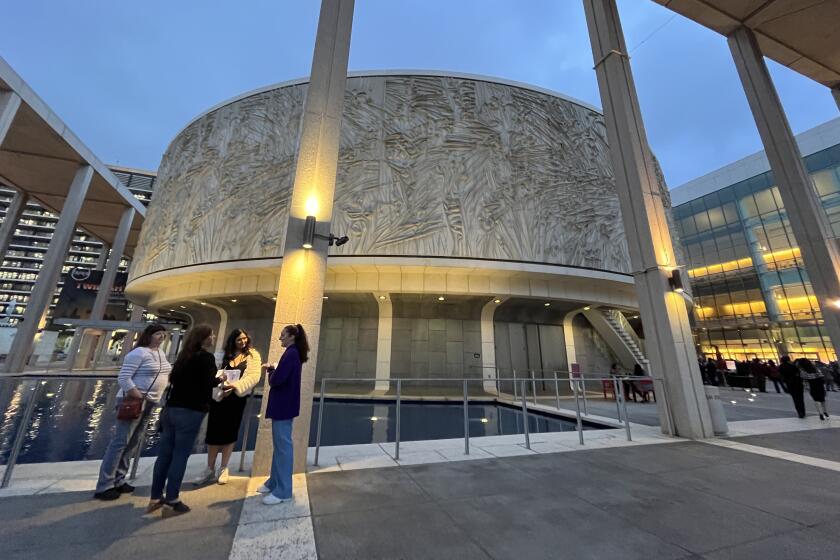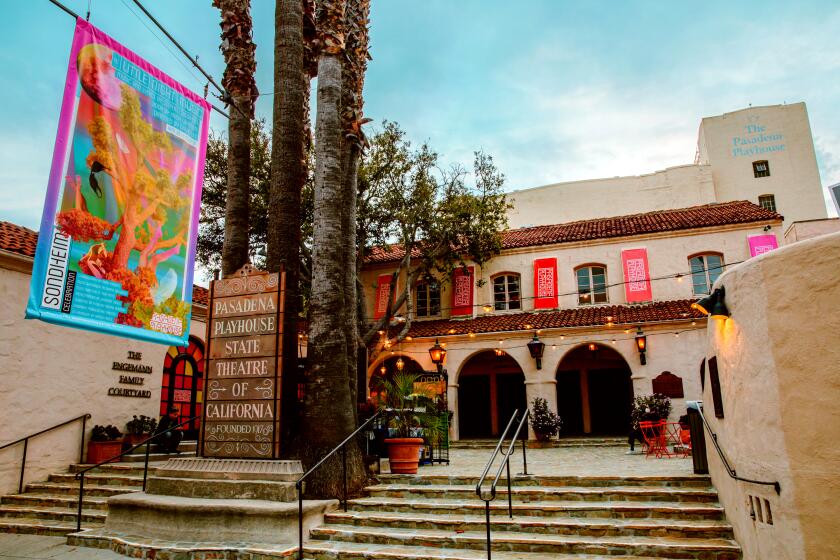Why did Center Theatre Group really halt programming at the Mark Taper Forum?
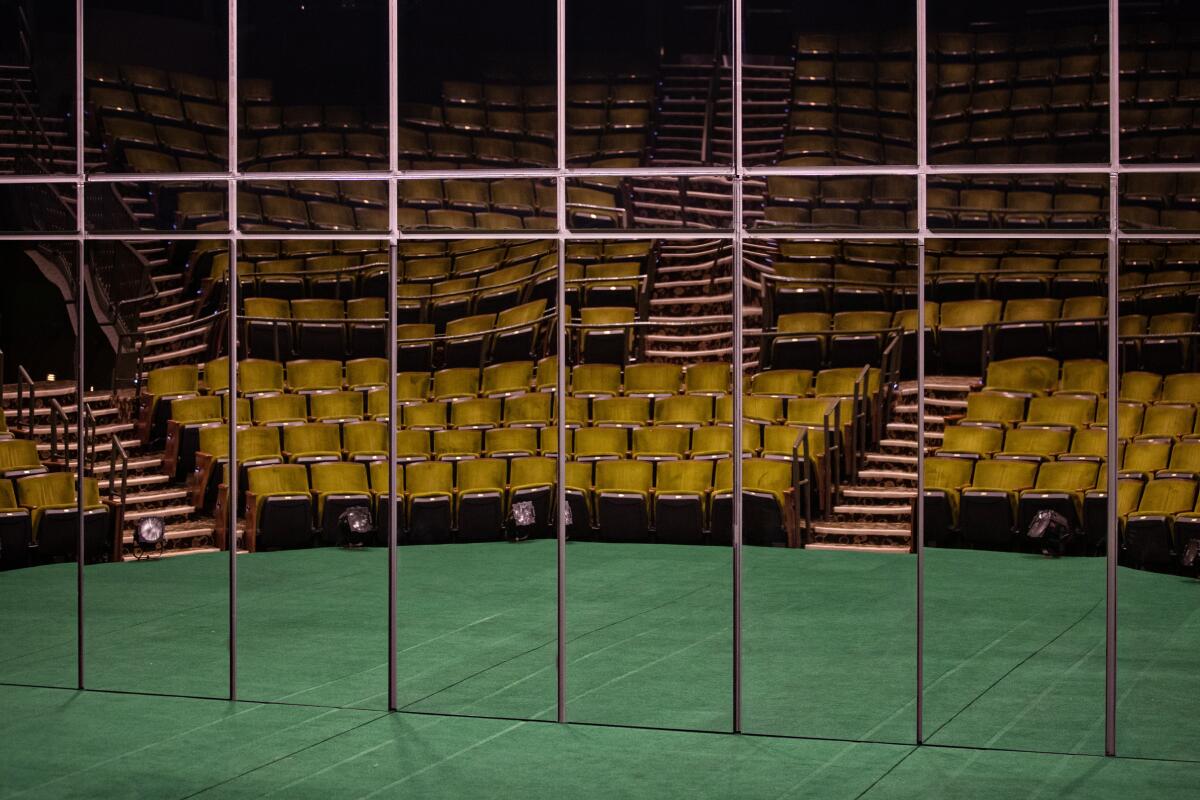
- Share via
There was no better option.
That’s the bottom line from Meghan Pressman, Center Theatre Group’s managing director and CEO, when pressed to explain the draconian decision to shut down programming at the Mark Taper Forum for the foreseeable future.
The Taper, founded by Gordon Davidson to be a public forum for ideas, is the company’s money pit. This was the case before the COVID-19 pandemic threw the nonprofit regional theater model into total chaos — and it’s definitely the case at a time when production costs are soaring, attendance still hasn’t returned to pre-pandemic levels, the federal emergency aid spigot has been turned off and philanthropic giving is waving a white flag.

Subscribers get exclusive access to this story
We’re offering L.A. Times subscribers special access to our best journalism. Thank you for your support.
Explore more Subscriber Exclusive content.
The Ahmanson Theatre, long a lucrative touring house, was historically the theater that floated the organization’s artistic ambitions. The Kirk Douglas, the smallest of the company’s three venues and ostensibly the most experimental, is the scrappy Culver City orphan, living at the sufferance of its older siblings at L.A.’s Music Center.
The pieces of this puzzle no longer fit together.
Center Theatre Group is closing the Mark Taper Forum and announced layoffs. Here’s what you should know about what’s happening there and elsewhere on L.A.’s arts scene.
“Taper shows lose the most money,” Pressman said in an interview with The Times. “That’s always been true. But right now they’re costing us twice as much as they would have before. And the Ahmanson is bringing in less than half of what it did. Donations are down. Ultimately, we just can’t afford to continue to lose a million dollars a show at the Taper. We had to pause.”
The meeting with Pressman, who joined CTG in 2019, and incoming artistic director Snehal Desai took place at the company’s administrative offices. The discussion was somber but enlightening — as much for what was unintentionally revealed as for what was stated outright.
To close or not to close — that was more or less the question. Pressman said the choice came down to either “pouring everything remaining into next season,” leaving “nothing left for Snehal’s first year,” or “pausing now to regather, aggressively fundraise, put the pieces back together and then do a full launch.”
Sign up for This Evening's Big Stories
Catch up on the day with the 7 biggest L.A. Times stories in your inbox every weekday evening.
You may occasionally receive promotional content from the Los Angeles Times.
“Part of this is that next year’s season wasn’t his season,” Pressman explained. “We haven’t had time to plan what his rollout looks like.” For Pressman, the prospect of digging a deeper budgetary hole for a transition year that the new artistic director didn’t curate seemed wrongheaded.
“We were just in a place that was unsustainable,” said Desai. A note of relief was detectable in his voice. “Executing a season” he had “not really programmed” while trying to artistically plan for the future in the face of a deepening financial “void” wasn’t an ideal way of starting, he acknowledged.
Pressman denied that the board of directors dictated the closure. “That’s not how it works for us,” she explained. “You know, for us, it’s a lot of collaboration and conversation with the board, and in my role I present the board with options and recommendations.”
Imagine my surprise, then, to have this statement contradicted in a newly published article in The Times by Larissa FastHorse headlined “What it feels like to have your history-making play canceled during the Taper’s closure.” Writing on the postponement of her play “Fake It Until You Make It,” which was to have been the first play by a Native playwright on the Taper mainstage, she bravely relates CTG‘s abrupt decision to the long history of erasure of Native culture.
Commentary: What it feels like to have your history-making play canceled during the Taper’s closure
My new play, “Fake It Until You Make It,” commissioned by Center Theatre Group, was about to go into production at their Mark Taper Forum when the organization indefinitely “paused” Taper programming. Real damage has been done to L.A. communities.
“This is hard to write because I was on the Theater Communications Group board with both Meghan Pressman and Snehal Desai and consider them friends,” FastHorse writes. “I spoke with them before writing this, so I know how deeply both of them care about art, artists and audiences. I know that it was their board of trustees that made the extreme, unexpected decision to cancel.”
When asked to clarify this discrepancy, Pressman explained in a text: “Larissa is right that the board did have ultimate approval but they did not do this solely on their own and it was done in consultation with me and Snehal. While an incredibly difficult decision, we collectively felt it was the right one for the company.”
Could funds not have been found to produce this last play in a season of female-identifying and nonbinary playwrights? When I expressed dismayed surprise, Pressman took issue with my calling “Fake It Until You Make It” the most anticipated “event of the year” at the Taper. I clarified my remark by saying that I was talking not about box office but about interest in this world premiere by a Native playwright whose best-known work, “The Thanksgiving Play,” was just produced on Broadway.
“I wouldn’t say that either,” Pressman said. “I think we programmed a lot of things that for different communities would have been the event of the year. ‘Transparent’ was that for some people.”
The Mark Taper Forum presents the world premiere of ‘A Transparent Musical,’ inspired by the Prime Video series and featuring a book by MJ Kaufman and Joey Soloway and a score by Faith Soloway.
“A Transparent Musical,” I pointed out in our discussion, was also an expensive artistic mess. Pressman acknowledged that it was extremely costly but that enhancement money from “Broadway-type producers” made it possible. Desai went to great lengths to assure me that FastHorse’s play will be done in his first Taper season, when he’ll be better able to look after it.
No one is disputing that CTG is between a rock and a hard place. No one is challenging that a perfect storm of hardships is wreaking havoc on nonprofit theaters nationwide. What is also hard to refute is that L.A.’s flagship theater organization has been bedeviled by leadership problems for several decades and that the company has been in a state of frenetic correction in the last few years, responding as much to its own past mistakes as to external challenges, such as a once-in-a-century pandemic that foiled the planning of even the best-run operations.
Shutting down the heart and soul of CTG even temporarily is an extreme move. The decision was precipitated by harsh budgetary reality. The fiscal year ending in June brought grim deficit news. As Pressman explained, “the capital” just isn’t there to sustain the level of “investment spending” that was undertaken to “demonstrate that theater is back.”
The titan of L.A. theater, Center Theatre Group, is shutting down the Mark Taper Forum for at least a year to save money. Will other theaters follow?
The habit of theatergoing has been seriously compromised since the COVID-19 pandemic forced public venues to shut down for more than a year. This recent history makes the Taper “pause,” as CTG is calling it, an especially risky gamble. How much more attrition can the company afford?
Pressman has confidence that loyalists will return. She pointed to the rebound that happened after the Taper was closed for a yearlong remodeling that began in the summer of 2007. The expectation was that this closure would have a devastating impact on the subscription base. “But when we looked at the data, it actually didn’t shrink a ton,” she said. “The recovery was more elastic.”
Desai has faith that “folks are not going to hold it against us that we had to make these hard” choices. He is heartened by the example of Danny Feldman, producing artistic director of Pasadena Playhouse, who had to immediately cancel programming to steady the ship when he was appointed in 2016. Feldman was in New York earlier this month to accept the Regional Theatre Tony Award for a company that just a few years ago was questioning its very survival.
Pasadena Playhouse wins the Tony Award for regional theater excellence, becoming only the second Los Angeles institution to earn the honor and continuing its triumphant streak after years of turbulence.
“As I said in my Tony speech, our regional theaters need us now more than ever in just about every way: memberships, ticket sales, and donations,” Feldman wrote in an email. “Some are further over their skis than others, but we are all heading in the same direction.”
No one is sheltered from these headwinds. Attendance is down, but the more troubling pattern is that theatergoers are less inclined to commit to subscriptions — the lifeblood of nonprofit theaters.
The Geffen Playhouse said its subscriptions are down by 40% since the pandemic while the number of single tickets sold per show on average has increased since reopening. (The Geffen is anticipating a bump in subscriptions next season.)
Pasadena Playhouse is still in the afterglow of its Sondheim Celebration. Feldman said that membership is 20% higher and that the festival’s two main Sondheim musicals (“Sunday in the Park With George” and “A Little Night Music”) did “very well.”
But he noted that even a successful season requires “extraordinary fundraising to balance the budget.” Plays are apparently much harder to sell post-pandemic. “I think this is a trend in L.A. theater in general for new work, something we’re all concerned about,” he said.
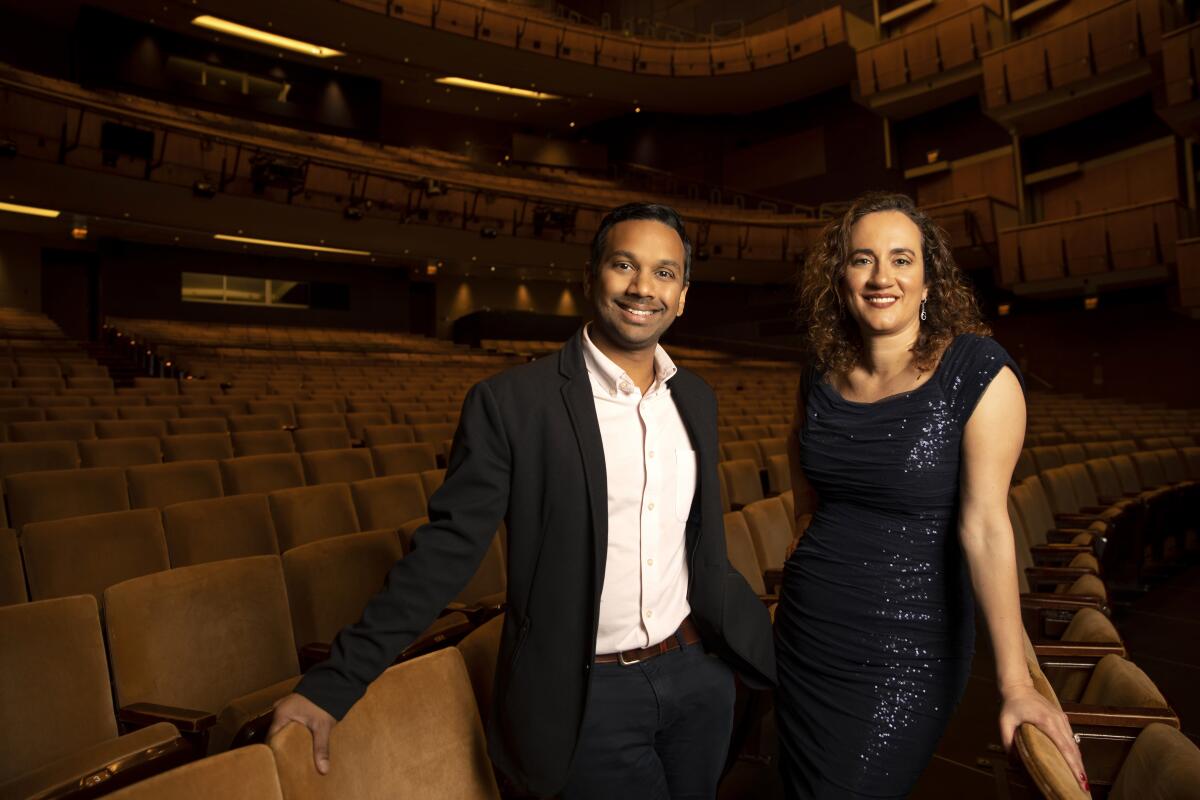
There have been a few notable hit dramas in recent years. The 2022 West Coast premiere of Jeremy O. Harris’ “Slave Play” broke a Taper box office record, grossing $1.4 million in five weeks while offering nearly 5,000 free and discounted tickets. Last year’s “Power of Sail,” the Paul Grellong drama starring Bryan Cranston, was the highest-selling season subscription production in Geffen Playhouse history.
But theatergoers are more reluctant to take chances on playwrights who lack Harris’ iconoclastic celebrity or plays that don’t have big-name film or TV stars in them. Single tickets allow people to pick and choose what they most want to see. The idea of supporting a cultural organization by subscribing to a full season is a luxury that fewer and fewer can afford.
“The hard thing about the arts is the money is all expended upfront,” said Desai. “We have to front the millions in cost of production. And that’s why we’re running into cash flow and other financial issues. The subscription model came about because you need money to launch a season and to keep it going.”
Even a bonanza of single-ticket sales is too late to cover costs. So a new business model must be found. But none of this is breaking news. Where did CTG’s leadership fall short?
Theater critic Charles McNulty interviews Snehal Desai, producing artistic director of East West Players, who has been named artistic director of Center Theatre Group.
“The biggest issue is not being able to read the future,” Pressman said. “Our hindsight is really great right now. But when we reopened, we didn’t know about Omicron or even Delta [COVID variants]. … I will say the predominant thing we’re experiencing right now has to do with the external threats of the environment. A lot of big companies are in similar financial difficulty and have been shielding that information. So I would say this is not so much a management weakness.”
There have been complaints from some theatergoers that programming has been too focused on identity politics since the reopening. Desai asked, “What would you like us to do, politically incorrect work? What is the counter that you’re offering? All work is political.”
But leaving aside the conservative backlash, is there a deeper artistic analysis that needs to be undertaken? I suggested that audiences would commit more willingly to seasons if the artistic vision were better communicated and the producing level were higher. Theatergoers don’t need an exclusive diet of masterpieces. But there’s only so much earnest mediocrity they can take.
I asked Pressman and Desai to state the Taper’s mission. I didn’t realize it was a trick question. The flummoxed looks were easily explained. The Taper doesn’t have its own mission. But CTG does: “To serve the diverse audiences of L.A.,” Desai said.
There’s more to it than that.
“One of the biggest gaps in the past two years is that it’s really hard to fundraise and build an annual fund when you don’t have an artistic leader with an articulated multiyear vision to rally around,” Pressman said. “I can ask a lot of people for money. I can articulate our importance. But the thing that is missing, even when you have multiple associate artistic directors who are all very visionary, is that people are looking for Snehal to be able to say, ‘This is our artistic vision. Here’s what we’re doing. And here’s what we’re going to do over multiple years.’ That has been absent.”
Vision has been in short supply since Davidson passed the torch to Michael Ritchie. Desai, the theater’s first artistic director of color, is bursting with ideas: for community building, for site-specific performance, for thinking outside the stultifying regional theater box. Though programming at the Taper has been suspended, he vows that the theater won’t be dark and is looking at this next year as a time of research into new performance and producing modalities.
CTG desperately needs his imaginative leadership. But the criticism started before he even signed his contract. “I already got an email about my woke programming of ‘1776.’ I didn’t program it, so there are people who are champing at the bit.”
The company has repair work to do with artists. It can start by protecting its new artistic director so that he can fill the organization with what has been conspicuously missing.
Following Michael Ritchie’s departure last year, Center Theatre Group is still in the early stages of its search for its next artistic leader. What does this deliberate, albeit sluggish, approach signal for the future of L.A.’s largest nonprofit theater organization?
More to Read
Sign up for This Evening's Big Stories
Catch up on the day with the 7 biggest L.A. Times stories in your inbox every weekday evening.
You may occasionally receive promotional content from the Los Angeles Times.
